The following are foods high in protein, which is almost completely absorbed by the body. Read on to find out more.
How foods are rated for protein digestibility
Diet protein is essential for muscle growth. Essential amino acids from food are the building blocks for new muscle cells, so that you won’t achieve muscle growth without enough protein.
However, in addition to the amount of protein in foods, it is also worth considering its nutritional value and digestibility. The protein digestibility corrected amino acid score (PDCAAS), or protein digestibility coefficient, is now used to assess protein digestibility.
PDCAAS shows how the amino acid composition of a product meets human needs. The upper limit of this scale is 1.0. Foods that have this ratio are best absorbed and are complete sources of protein.
The PDCAAS figures for the products below are taken from Kevin B. Comerford of the California Dairy Research Foundation. Remember that eating well without exercise will not lead to muscle building.
Read also: Who Should Eat Flax Seeds And Why?
Best Muscle Building Products
1. Milk
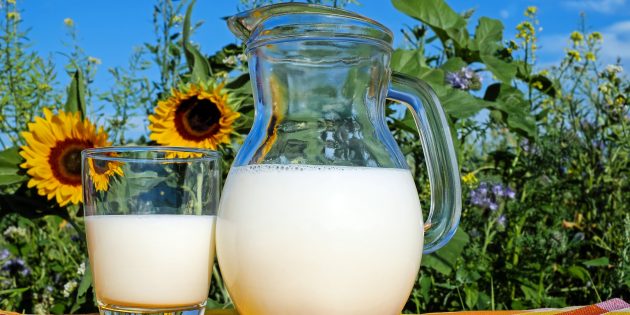
Calories per 100 g of product: 60.
Protein content per 100 g of product: 3.2 g.
PDCAAS: 1.0.
In a scientific review, Matthew Stark of Northern Illinois University points out that milk is almost completely absorbed by the body, inducing protein synthesis and tissue repair, and provides all the essential amino acids.
Overview of scientific research in 2008 showed that milk dramatically increases muscle protein synthesis. Post-exercise milk consumption combined with strength training for 12 weeks increases muscle hypertrophy and lean muscle mass.
A study in 2006 showed that whole milk provides 2.8 times more threonine (an essential amino acid that helps build muscle protein) than skim milk and 80% more phenylalanine (another essential amino acid found in body proteins).
2. Curd
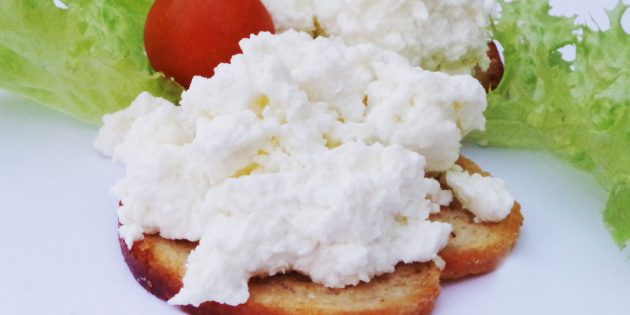

Calories per 100 g of product: from 71 to 159, depending on the fat content.
Protein content per 100 g of product: 16.7 g.
PDCAAS: 1.0.
Cottage cheese is 70% casein, a slow-digesting complex protein. This means that the level of amino acids in the blood rises slowly and remains elevated for 6-8 hours. Therefore, cottage cheese is often advised to be eaten before a long break between meals, for example, at night. This allows you to maintain anabolism until your next meal.
Also, curd contains a lot of calcium, which is necessary for muscle contraction and plays an important role in transporting amino acids and creatine.
3. eggs
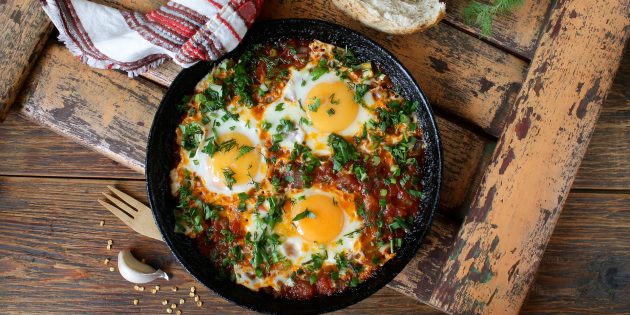

Kcal per 100 g of product: 74.
Protein content per 100 g of product: 12 g.
PDCAAS: 1.0.
According to research Jose M. Miranda, 15 grams of egg white protein contains 1,300 mg of leucine. A recent experiment showed that leucine elicits a maximal anabolic response in skeletal muscle in young adults, so that that egg protein may have a major effect on muscle building.
It is leucine that stimulates the synthesis of skeletal muscles, regardless of other amino acids. Also, leucine reduces the rate of muscle protein breakdown.
And egg yolk contains 3.44 milligrams of zinc per 100 grams of the product. Zinc is also beneficial for muscle growth. A study in 2016 showed that zinc is necessary to form insulin-like growth factors, which provokes muscle development.
Nutritionists often advise eating no more than four eggs per week due to the high cholesterol level (200-300 mg) in the yolk. However, despite a lot of research, there is still no consensus about the dangers of eggs for heart health.
José Miranda’s article suggests that only 30% of the world’s population is hypersensitive to dietary cholesterol, and the remaining 70% are hypersensitive. The former already have high cholesterol levels and can be harmed by consuming large quantities of eggs, while the latter will have more health benefits than harm. As Miranda points out, modern nutritional guidelines allow one egg a day.
4. Beef
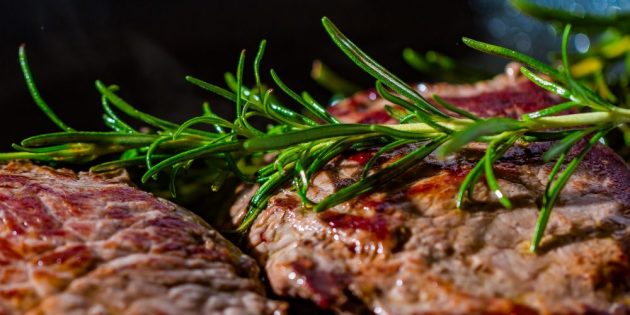

Kcal per 100 g of product: 158.
Protein content per 100 g of product: 25 g in boiled beef.
PDCAAS: 0.92.
Beef contains high-quality protein, which contains all the essential amino acids in the same proportions as in a human muscle.
A 2014 study proved the effectiveness of beef consumption to increase fat-free mass. The study involved 26 healthy young people. The first post-workout group ate 135 grams of canned beef with 20 grams of protein and 1.7 grams of fat per 100 grams of the food—the second control group trained without further food intake. After eight weeks, the first group had an increase in fat-free mass of 2.3 kilograms.
A study in 2011 confirmed that exercise combined with 240 grams of beef increases muscle protein synthesis in both young (29 ± 3 years) and older (67 ± 2 years) participants.
A study in 2015 showed that beef protein is as effective for building muscle as whey protein. After eight weeks of training and protein intake, participants consuming beef protein gained 5.7% fat-free mass, lost 10% body fat, and increased their one-rep max in bench press and deadlift compared to the group not using protein supplements.
Also read: 5 Reasons To Eat Turmeric Every Day
5. Chicken breast
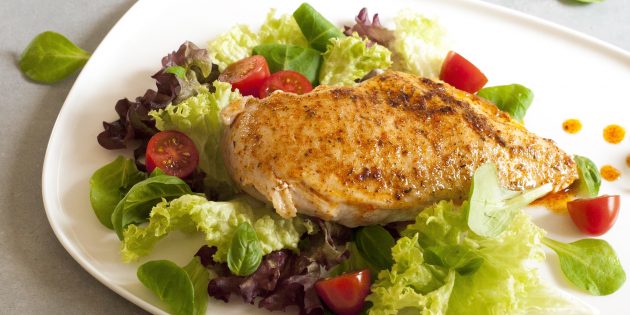

Calories per 100 g of product: about 165.
Protein content per 100 g of product: 31 g in the boiled breast.
PDCAAS: 0.92.
The study has shown that chicken protein has the same effect on muscle building as beef protein and whey protein. Participants in the experiment, consuming protein from chicken, increased their mass without fat by an average of two kilograms and increased their one-rep max in deadlifts and bench press.
Chicken breast is prized among bodybuilders for its high-quality protein and low-fat content – only 1.9 grams per 100 grams of the product. If you have high cholesterol, prefer the breast over the other parts of the chicken. Research has shown that 100 grams of chicken breast contain 53 milligrams of cholesterol, and the thigh contains 82.9 milligrams.
Adapted and translated by Wiki Avenue Staff
Sources: Life hacker






